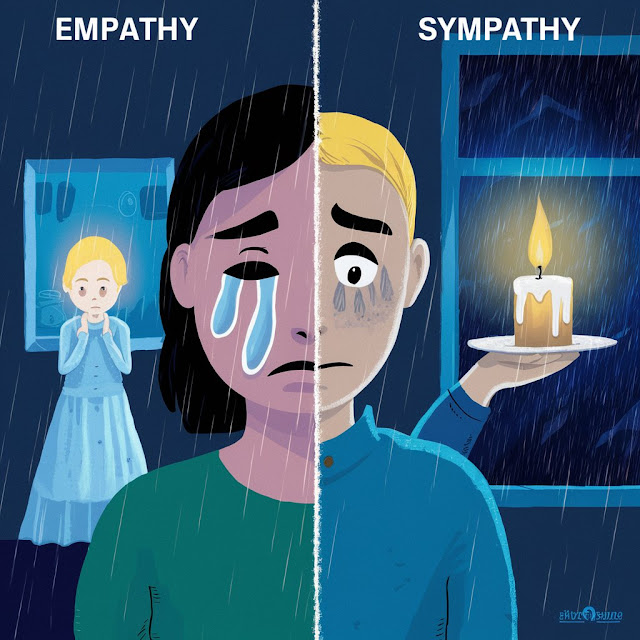Difference Between Sympathy And Empathy With Example ?
Difference Between Sympathy And Empathy With Example ?
Sympathy and empathy are both related to understanding and sharing emotions, but they differ in their level of involvement and perspective.
Sympathy is the ability to recognize and acknowledge someone else's emotions or hardships and feel concern or compassion for them. It's more about feeling sorry for someone or acknowledging their situation without necessarily experiencing their emotions firsthand.
Empathy, on the other hand, involves putting yourself in someone else's shoes and truly understanding and sharing their feelings. It goes beyond sympathy because it involves actually experiencing the emotions of another person, understanding their perspective, and connecting with them on a deeper level emotionally.
In essence, sympathy is feeling for someone, while empathy is feeling with someone. Empathy requires a deeper level of emotional intelligence and connection, as it involves truly understanding and resonating with the emotions of others.
Here are some additional points of comparison between sympathy and empathy:
1. Understanding vs. Feeling: Sympathy involves understanding someone's emotions or situation, while empathy involves actually feeling those emotions alongside the person experiencing them.
2. Connection: Empathy typically creates a stronger sense of connection between individuals because it involves sharing emotions. Sympathy, while compassionate, may not always foster the same level of connection.
3. Personal Experience: Empathy often arises from personal experiences or the ability to imagine oneself in similar situations. Sympathy can exist without such personal connections.
4. Response: Sympathy often results in expressions of concern or compassion, while empathy can lead to more meaningful actions or support because of the deeper understanding of the other person's feelings.
5. Communication: Empathy can facilitate better communication because it involves a deeper understanding of the other person's perspective and emotions. Sympathy might not always lead to the same level of effective communication.
Both sympathy and empathy have their place in human interactions, and they can both be valuable in providing support and understanding to others.
Let's illustrate sympathy and empathy with examples:
1. Sympathy: Imagine a friend tells you they lost their job. You respond with sympathy by saying, "I'm sorry to hear that. Losing a job can be tough. Let me know if there's anything I can do to help." In this scenario, you're acknowledging your friend's situation, expressing concern, and offering support, but you might not fully understand the emotional impact unless you've experienced a similar situation yourself.
2. Empathy: Now, imagine another friend tells you they lost their job. This time, you respond with empathy by saying, "I can only imagine how difficult this must be for you. Losing a job can be incredibly stressful and worrying about the future can be overwhelming. If you want to talk or need any support, I'm here for you." In this example, you're not only acknowledging your friend's situation, but you're also expressing a deeper understanding of the emotions they might be experiencing because you've been through a similar situation before or can imagine how it would feel. You're offering support based on a genuine understanding of their feelings.
In both cases, you're showing care and concern for your friend, but in the second example, you're demonstrating empathy by connecting with their emotions on a deeper level.
More Difference Between
